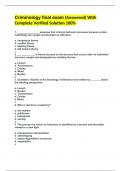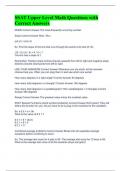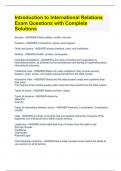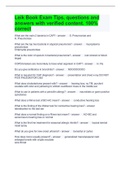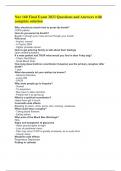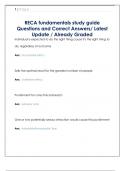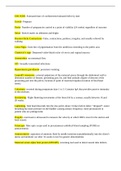Week 1
Political communication = the interactions between politics, media and the public
What is political communication
● Deals with the relationship between political actors, media / journalist and the citizens
● Research is driven by the question who “shapes” these relationships, and ultimately
who controls whom?
● Focus on power relations
What do we expect from the media?
● They have certain responsibility in our system
● (Free) media as fourth estate
Functions of media in a democratic society
Information function Monitoring, inform the citizens
Education function Explaining what events and facts mean
Watchdog function Control over politics, publicity for what politics does (wrong)
Platform function Exchange of ideas → public sphere
Channel function Political, ideological opinions needs to find their way to the people
Threats to performing these functions?
1. The audience not being able/willing to process the information provided, or
distinguish news from misinformation
● Videomalaise
➔ Watching (information on) television has negative effects on the public
➔ E.g. cynicism, low trust in political institutions, low sense of “political
efficacy”
➔ = the feeling that you can understand politics and also do something yourself
● Dumbing down
➔ People cannot (and don't want to) process political information (anymore)
➔ Later : criticism to mediamalaise theory
● Positive effects of media content are possible
1
, ● Some, rather sensational elements can be good to some extent, to reach
more people
● Journalists should focus on the audience as citizens, and can try to
address them all
What functions are threatened?
● Platform function
● Education function
● Channel function
● Information & Watchdog function: not so much
Solution: rebuilding trust in media, avoiding filter bubbles and echo chambers, political
satire, regulations for social media
2. Journalist getting stuck into safe routines, instead of providing the information the
public needs
● Journalists focus on the elite opinions
● If elites agree, no other opinions are presented
● Reasons : routines, easiness, safety/ risk-avoidance
Which functions are threatened?
● Platform function and watchdog function
● The other functions to the extent that some information and interpretations will not
make it into the news
● Solutions: different approach to journalism (e.f. Journalists with an adversarial role
conception)
3. Commercialisation , leading to decrease news quality, media logic
● Shift from the normative to the commercial pole (journalistic perspective)
● Commercialization → maximising the audience (maximum profit), so : sensational
news
● “News coverage that provokes the senses and emotions of audience members, thus
attracting the attention of a larger audience”
● Leads to the inclusion of sensational elements in the news (topics, format, vividness)
● Elements of entertainment enter the news
Lower quality, how does it work?
News = commodity. People can get it for free, so they get it for free (online)
● Business models of traditional journalism fail
● Consequences: budget cuts, decreasing investments in quality journalism, media
concentration, market logic takes over, increased competition for attention of the
audience and advertising revenues
➔ Sensationalism and lower news quality
2
,And quantity? Information abundance?
● The information abundance we experience e.g. via internet and social media = partly
misleading
● Example: pew project for excellence in journalism → news ecosystem (study on
Baltimore)
● Where does news come from?
95% of the news traced back to traditional media
Baltimore sun: 32% less stories in 10 years, 73% less in 20 years
Which functions are threatened ?
● Information function : less information
● Education : less, costs money
● Platform function: under pressure due to decreased pluralism
● Watchdog function = expensive, so less
● Channel function : no problem (= cheap)
For Politics: Media logic as part of a bigger story?
● Yes!
● Evolutions go together with larger societal trends
● (individualisation, depillarization , the crisis of parties , increased voter volatility,
commercialisation etc. )
● Example
➔ Sacerdotal approach before vs. pragmatic approach now
➔ Blumler & kavanagh : 3 ages of political communication
➔ Brants & Van Praag (2006): partisan logic, public logic and media logic
It is all a process (or several processes)
Mediatization
3
, 1st phase of = mediation = when the media become the main communication
mediatization channel between politics and the public
2nd phase of ● Media become more independent
mediatization ● Higher journalistic professionalism
● The political system still has the upper hand
● Media do not mediate messages unconditionally anymore
3rd phase of ● Media become so independent that other actors have to adapt to
mediatization them
● Media have the upper hand, but are still external to the political
system
● Politicians have to further increase skills to do this adaption of
the media logic (= following the format, content, grammar and
rhythm of the media) → especially in campaigns
4th phase of ● Politics does not adapt, they adopt the media logic
mediatization ● Standards of media logic / newsworthiness become part of
governing processes (evaluation of issues and policies)
● Media are no longer external
● Politicians who need to answer to people are most affected
Some nuances
Mediatization yes, but no universal fourth phase
● It is not a global or unidirectional trend
● Media do not, and will not take over political functions
● Moderation of mediatization, depending on political system, media system, strength
of parties etc
But: on social media, many politicians follow this commercial media logic
Don't forget the other factors:
● Ideologies still matter
● Various “political cleavages” matter, media cannot just bridge them
● The initiative of what seems to be media influence may originate from politics
● The initiative may originate from the public or NGOs
● Maybe political actors are just being smart?
4. Political actors (re)gain control over media content (lack of pluralism and
independence)
● Lack of independent of media
● Lack of internal and external pluralism
● Examples:
➔ Censorship
4
Political communication = the interactions between politics, media and the public
What is political communication
● Deals with the relationship between political actors, media / journalist and the citizens
● Research is driven by the question who “shapes” these relationships, and ultimately
who controls whom?
● Focus on power relations
What do we expect from the media?
● They have certain responsibility in our system
● (Free) media as fourth estate
Functions of media in a democratic society
Information function Monitoring, inform the citizens
Education function Explaining what events and facts mean
Watchdog function Control over politics, publicity for what politics does (wrong)
Platform function Exchange of ideas → public sphere
Channel function Political, ideological opinions needs to find their way to the people
Threats to performing these functions?
1. The audience not being able/willing to process the information provided, or
distinguish news from misinformation
● Videomalaise
➔ Watching (information on) television has negative effects on the public
➔ E.g. cynicism, low trust in political institutions, low sense of “political
efficacy”
➔ = the feeling that you can understand politics and also do something yourself
● Dumbing down
➔ People cannot (and don't want to) process political information (anymore)
➔ Later : criticism to mediamalaise theory
● Positive effects of media content are possible
1
, ● Some, rather sensational elements can be good to some extent, to reach
more people
● Journalists should focus on the audience as citizens, and can try to
address them all
What functions are threatened?
● Platform function
● Education function
● Channel function
● Information & Watchdog function: not so much
Solution: rebuilding trust in media, avoiding filter bubbles and echo chambers, political
satire, regulations for social media
2. Journalist getting stuck into safe routines, instead of providing the information the
public needs
● Journalists focus on the elite opinions
● If elites agree, no other opinions are presented
● Reasons : routines, easiness, safety/ risk-avoidance
Which functions are threatened?
● Platform function and watchdog function
● The other functions to the extent that some information and interpretations will not
make it into the news
● Solutions: different approach to journalism (e.f. Journalists with an adversarial role
conception)
3. Commercialisation , leading to decrease news quality, media logic
● Shift from the normative to the commercial pole (journalistic perspective)
● Commercialization → maximising the audience (maximum profit), so : sensational
news
● “News coverage that provokes the senses and emotions of audience members, thus
attracting the attention of a larger audience”
● Leads to the inclusion of sensational elements in the news (topics, format, vividness)
● Elements of entertainment enter the news
Lower quality, how does it work?
News = commodity. People can get it for free, so they get it for free (online)
● Business models of traditional journalism fail
● Consequences: budget cuts, decreasing investments in quality journalism, media
concentration, market logic takes over, increased competition for attention of the
audience and advertising revenues
➔ Sensationalism and lower news quality
2
,And quantity? Information abundance?
● The information abundance we experience e.g. via internet and social media = partly
misleading
● Example: pew project for excellence in journalism → news ecosystem (study on
Baltimore)
● Where does news come from?
95% of the news traced back to traditional media
Baltimore sun: 32% less stories in 10 years, 73% less in 20 years
Which functions are threatened ?
● Information function : less information
● Education : less, costs money
● Platform function: under pressure due to decreased pluralism
● Watchdog function = expensive, so less
● Channel function : no problem (= cheap)
For Politics: Media logic as part of a bigger story?
● Yes!
● Evolutions go together with larger societal trends
● (individualisation, depillarization , the crisis of parties , increased voter volatility,
commercialisation etc. )
● Example
➔ Sacerdotal approach before vs. pragmatic approach now
➔ Blumler & kavanagh : 3 ages of political communication
➔ Brants & Van Praag (2006): partisan logic, public logic and media logic
It is all a process (or several processes)
Mediatization
3
, 1st phase of = mediation = when the media become the main communication
mediatization channel between politics and the public
2nd phase of ● Media become more independent
mediatization ● Higher journalistic professionalism
● The political system still has the upper hand
● Media do not mediate messages unconditionally anymore
3rd phase of ● Media become so independent that other actors have to adapt to
mediatization them
● Media have the upper hand, but are still external to the political
system
● Politicians have to further increase skills to do this adaption of
the media logic (= following the format, content, grammar and
rhythm of the media) → especially in campaigns
4th phase of ● Politics does not adapt, they adopt the media logic
mediatization ● Standards of media logic / newsworthiness become part of
governing processes (evaluation of issues and policies)
● Media are no longer external
● Politicians who need to answer to people are most affected
Some nuances
Mediatization yes, but no universal fourth phase
● It is not a global or unidirectional trend
● Media do not, and will not take over political functions
● Moderation of mediatization, depending on political system, media system, strength
of parties etc
But: on social media, many politicians follow this commercial media logic
Don't forget the other factors:
● Ideologies still matter
● Various “political cleavages” matter, media cannot just bridge them
● The initiative of what seems to be media influence may originate from politics
● The initiative may originate from the public or NGOs
● Maybe political actors are just being smart?
4. Political actors (re)gain control over media content (lack of pluralism and
independence)
● Lack of independent of media
● Lack of internal and external pluralism
● Examples:
➔ Censorship
4


